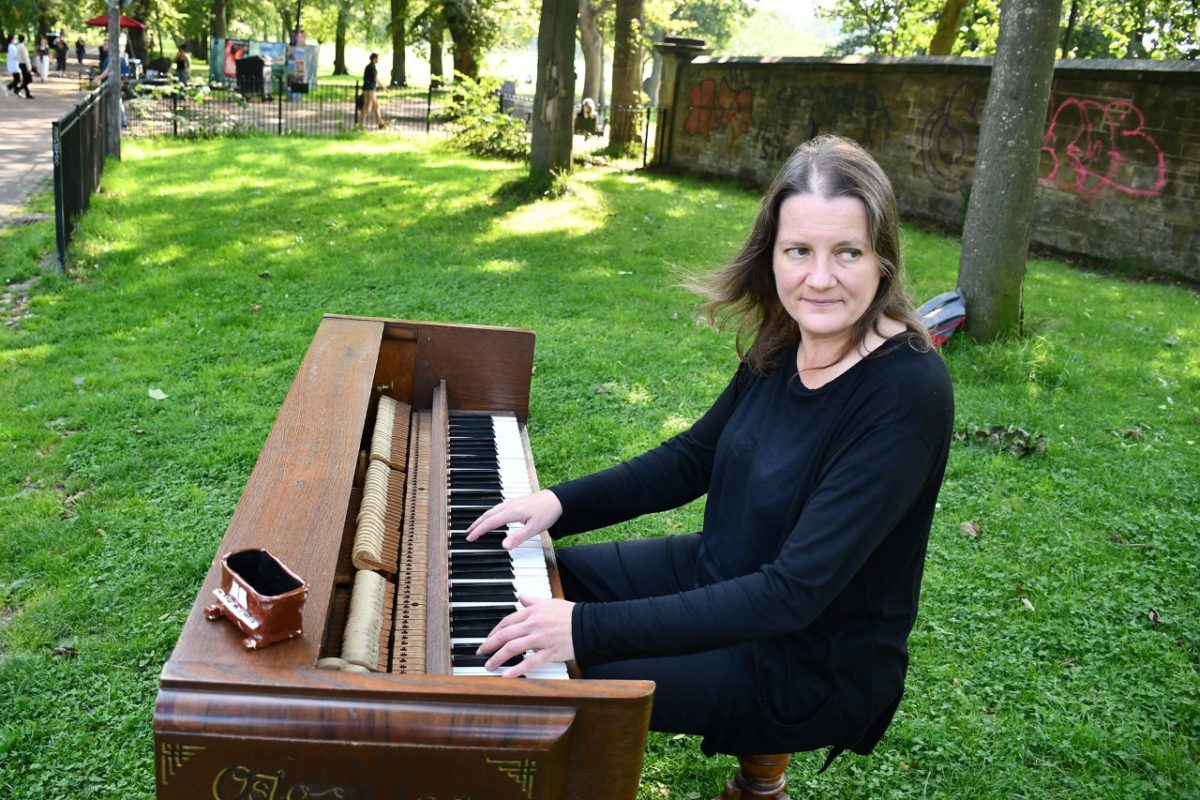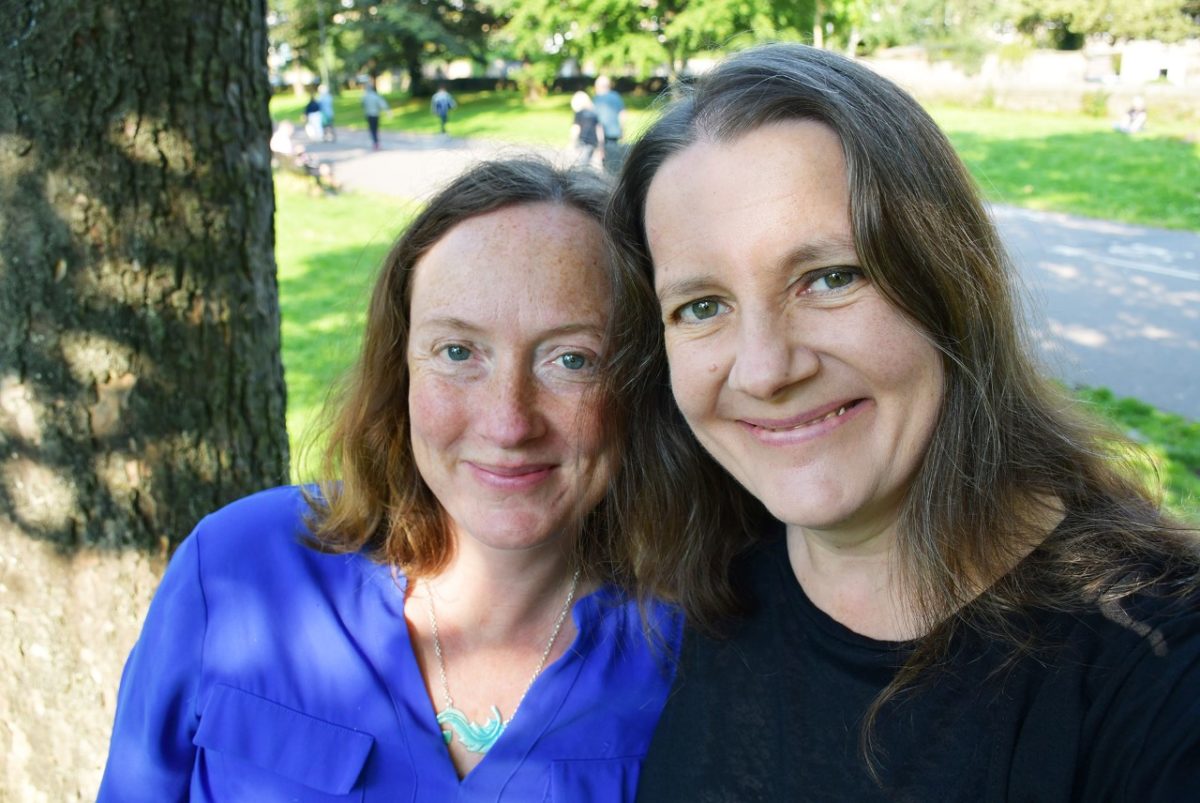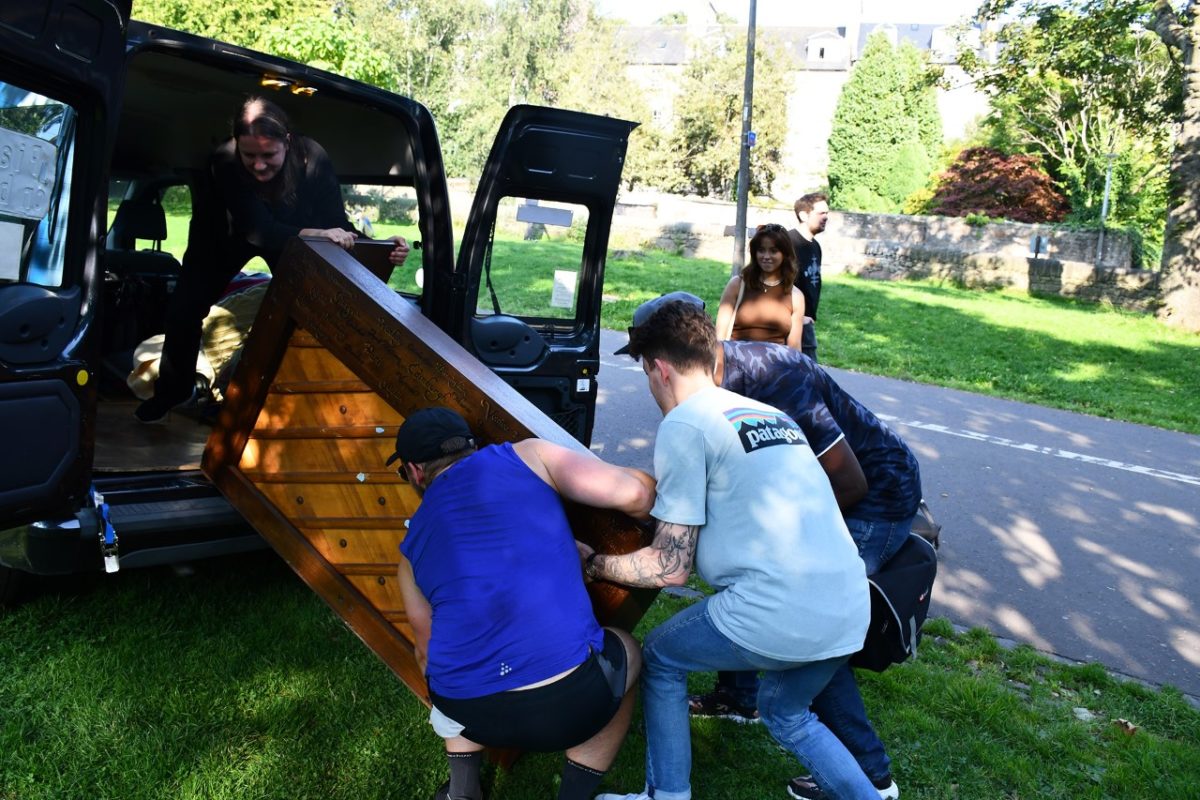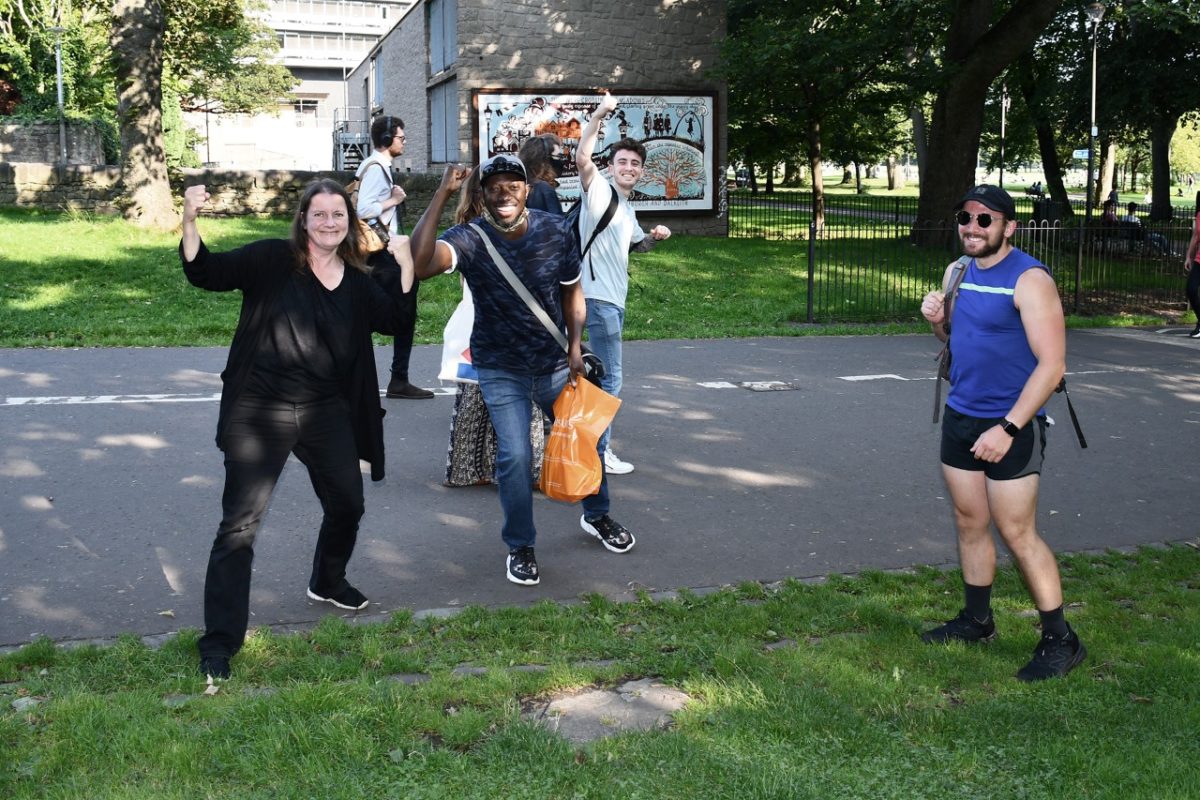Vroni Holzmann played The Meadows this summer
It’s summer, mid-festival, and Edinburgh’s Middle Meadow Walk is a flow of people, passing through on their way to the park or the city centre, or perhaps some show – though these are few and far between since this was during the second year of pandemic.
Some charge along. Others have stopped to listen to some galloping Ragtime being played by a woman at a piano sitting on the grass. Singing in the Rain starts to tinkle across the keys. A small child has got out of her pushchair and started to dance. Her mother claps and smiles.
These people have stopped because there’s a piano, there, in the outdoors, and because pianist Vroni Holzmann is playing some intoxicating tunes.
Signs decorate the wooden structure of the piano. “A Pound a boogie,” one declares in florid script, before listing tunes, including, “Ain’t Misbehavin’, The Entertainer, I Got Rhythm, Alligator Crawl”.
Its back panel is also painted with the names of towns and cities it has visited: Glasgow, Hamburg, Verona, Salzburg, Venice, Brighton, Falkirk and countless others.

This is a piano that has been making forays into the outdoors for over twenty years now. Short and squat, it has its action – its strings and hammers – underneath the keyboard than the more common upright design in which the action is housed above. It’s something Holzmann appreciates about her instrument, the low design which means that rather than face wooden panels she can make eye contact with passers-by.
“If you sit at a normal piano,” she said, “you sit at a wall and you don’t really know what’s going on around you. So at first when I played it was quite difficult. I did a full-on tour of Germany with an upright, and that was a hard aspect of it – everybody is at your back watching you and you don’t know what’s going on and that’s not ideal for busking.”
In 2000 she switched to this piano, neat, functional, and now decorated. It’s also a perfect size to fit in a van. “It’s as heavy as any piano – because the action is there, it’s just underneath. But it fits in the van and I think a full-sized one might not. It has a good metal frame and because of that it stays in tune quite well, because a lot of pianos would not cope at all with what I’m doing. They would just be out of tune.”

Holzmann has taken her piano out onto the streets, either on tour or to her favoured spot at the edge of the Meadows during the Edinburgh Festival, almost every year since she first started in 1999. The only years she didn’t haul it out there were the pandemic summer of 2020 and another year when the piano was broken and she couldn’t get it fixed in time.
The sun is shining and it happens to be a perfect busking day. A small group sit on the grass drinking cans of beer. Some glance our way and smile. Others rush past, sometimes looking over their shoulders as if they are suddenly wondering what it was they just heard. “Sometimes they have headphones in,” said Holzmann. “They don’t even hear. In the olden days it was all a little different. There wasn’t that.”
Holzmann is a composer of emotional and transporting post-minimalist music, but that’s not the type of atmosphere she goes for when she’s out here. Mostly she plays fun tunes, including the Scott Joplin ragtime pieces that she became obsessed with when she was a teenager growing up near Munich in Germany. “I would be in school waiting to go home and play my piano for hours and I would just start up on these ragtimes They’re quite difficult and I would just practice them all the time. So I discovered all that old music then. I love it. It’s beautiful.”
Only one of the pieces, Reminiscence is her own composition, a charming, upbeat waltz, it is part of the repertoire and plays well in a run of pieces that includes some Chopin waltzes.
Holzmann describes herself as “not a concert pianist, but someone who wants to bring the art and music to the people”. She wants to place herself right there in the city, playing where anyone might hear it. “I wanted to make the piano accessible. I really have a bit of an issue with this whole ticketed, concerts, bums on seats things, that’s fine in some cases but there needs to be other things where people just come across it. It can’t be restricted to that. Because not everyone can organise it, not everyone has money.”

The biggest challenge of any al fresco performance is getting the piano there.
“That’s the toughest thing about it.” She says. “Which is why sometimes I think are you going to continue this? This year I didn’t think was going to play and then this friend said, But you know it’s like a social responsibility. You should bring the fun and the music to the people. Cheer them up. That made sense to me.”
One of the things she noticed this year, an August that enjoyed a reduced number of shows, performers and visitors arrive at the city, is that there is a more downbeat pandemic vibe. “It isn’t as easy to cheer people up as usual. There is something that is holding them back.”
This is a spot at which Holzmann has always played, at the edge of a throughfare from the main stretch of the park to the city streets, a bustle of people. Other nearby patches, she says, aren’t nearly so good. “It’s on the grass and that’s a nice vibe, to play in nature. It’s also good because I can access it with the van.”
The idea of taking a piano out into the street first came to her in 1999, but at the time the only piano she had was unsuitable, particularly as it was housed in a flat on the fourth floor. She bought a piano from a charity shop and a cheap van with just 3 months on its MOT. “It was meant to be for one festival. A piano for £50, a van for £500.”
Always, when on tour, she travels with helpers. Once, she recalls, she went on the road with her mum and daughter. “My mum was 77 and my daughter nine. We did Vienna together. And mum also went on me on a Highland tour, all the way north to Thurso. To be fair a helper doesn’t have to be a strong person. They can look after my piano when I take the van away. And I need to find people to help loading anyway. To load I need several strong people. To unload two, to load three really.”
Are there places she has already played that she would like to go back to? “I would love to play in Paris with permission because we played without and that didn’t last very long. The police were there straight away. We just set it up near the Eiffel tower, if we don’t have permission we might as well just set up where we want.”
Paris is not the only place she has played without permission. There was also London. And Verona too. “We tried really hard to get permission to play in Verona, but couldn’t, so we just played. And the police again were there within a couple of tunes, and very stern faces as if this was a really big crime and I stopped playing. And then these punters who had been listening started arguing with the police. ‘Come on, let her play! It’s great!’”

The main tip she offers is to go with low expectations. “You can’t expect an audience, you can’t expect money. You can’t even expect to play well because the weather might harass you. When it works it’s great – but you can’t think oh it will be great, like a concert, because you don’t know what it will be like on the day. There are many factors that can make things difficult. There can be other buskers, there can be noise from somewhere, there can be people who are a bit difficult. The playing is exhausting particularly when the weather is tricky. But sometimes the magic happens.”
During the summer I was Holzmann’s “helper” – in as much as it was me who stood guard over the piano while Holzmann went off to get her van. She arrived back ten minutes later, opened the back doors and immediately starts scanning the pavement for pedestrian brawn. It took moments for her to catch the attention of a man dressed in shorts who looks as if he spends a significant number of weekly hours at the gym.
Seconds later she recruits more muscle power. There are smiles all round at the thought of shifting a piano, a few instructions, then movement. A perfect piece of choreography as the piano is tilted up and in. It feels like the final flourish, the coda.
The doors closed and the piano was done for the day.